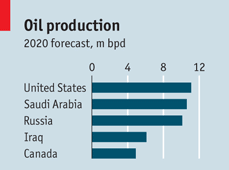
Are we entering an Age of Scarcity? For a number of years, our stock answer to this question is that we are. This answer was formed, in part, by the view that Peak Oil - the point at which 50% of the oil resources of the planet were out of the ground - had been passed. A recent report by the International Energy Association suggests that this assumption could be mistaken. According to the IEA, the production of oil in the United States is growing at a pace that will make it the worlds largest oil producer by 2020, and which will leave the US self-sufficient in energy by 2035. The IEA report also suggests that American production of oil will outstrip that of the current oil producers, such as Saudi Arabia, by 2020. This forecast is shown in the graph, which originates from The Economist, using IEA data.
There is a bit more to the story than just the changing patterns of energy production. There is also an appreciation of the impact of water resources upon energy production. This is a point made in a piece in the Daily Telegraph, that modern energy production tends to be rather water intensive. It highlights that our future potential energy abundance could be curtailed by water shortages. A different approach was taken in the New York Times, which highlighted some of the assumptions made by the IEA about energy usage in the US. It would appear that the forecast relies heavily on the introduction and widespread use of energy saving technologies in the US, to place something of a cap upon the consumption of oil derived products.
Where does that leave the scarcity agenda? In one respect, we could take the view that the whole issue of Peak Oil has been something of an alarmist position, and that the worst aspects of Peak Oil were never going to happen. There is an element of truth in this view. The concept of Peak Oil, as used by futurists, served as something of a warning of an unpleasant future for which there was time to avoid. We could take the view that this is happening.
In many respects, this reinforces the scarcity agenda. One could argue that, in the face of an impending shortage of oil, the price mechanism has worked to ensure that technologies have been developed to secure a new supply of oil, and are currently working to improve a more efficient use of the oil which we do have. This was always going to be the path out of scarcity, in which case, we could say, the whole scarcity agenda has had an effect.
We are caught between the two positions. The development of new production methods for extracting oil are not cost free. They tend to have a large environmental footprint, the externalities of which are nowhere near being covered in the current market price of oil. It is almost a position where we can continue to drive our cars, but at the costs of the environment. There is also a case to say that we are moving a key scarcity from one area (oil) to another (water). In doing so, we are fudging the problem rather than solving it.
There is a case to say that we have seen the end of Peak Oil - for the moment - but that does not mean that we have grounds to rejoice. We have yet to see the full bill for this development.
Stephen Aguilar-Millan
© The European Futures Observatory 2012
There is a bit more to the story than just the changing patterns of energy production. There is also an appreciation of the impact of water resources upon energy production. This is a point made in a piece in the Daily Telegraph, that modern energy production tends to be rather water intensive. It highlights that our future potential energy abundance could be curtailed by water shortages. A different approach was taken in the New York Times, which highlighted some of the assumptions made by the IEA about energy usage in the US. It would appear that the forecast relies heavily on the introduction and widespread use of energy saving technologies in the US, to place something of a cap upon the consumption of oil derived products.
Where does that leave the scarcity agenda? In one respect, we could take the view that the whole issue of Peak Oil has been something of an alarmist position, and that the worst aspects of Peak Oil were never going to happen. There is an element of truth in this view. The concept of Peak Oil, as used by futurists, served as something of a warning of an unpleasant future for which there was time to avoid. We could take the view that this is happening.
In many respects, this reinforces the scarcity agenda. One could argue that, in the face of an impending shortage of oil, the price mechanism has worked to ensure that technologies have been developed to secure a new supply of oil, and are currently working to improve a more efficient use of the oil which we do have. This was always going to be the path out of scarcity, in which case, we could say, the whole scarcity agenda has had an effect.
We are caught between the two positions. The development of new production methods for extracting oil are not cost free. They tend to have a large environmental footprint, the externalities of which are nowhere near being covered in the current market price of oil. It is almost a position where we can continue to drive our cars, but at the costs of the environment. There is also a case to say that we are moving a key scarcity from one area (oil) to another (water). In doing so, we are fudging the problem rather than solving it.
There is a case to say that we have seen the end of Peak Oil - for the moment - but that does not mean that we have grounds to rejoice. We have yet to see the full bill for this development.
Stephen Aguilar-Millan
© The European Futures Observatory 2012
 RSS Feed
RSS Feed



